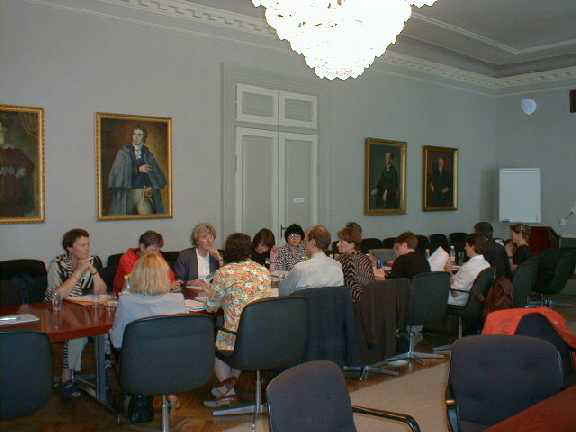A meeting is not a personal performance, but
the result of a collective processing of individual experiences in order to formulate
effective solutions for items on the agenda. Therefore it is necessary that all
participants have a reasonable knowledge of items for discussion and are capable of
analysis on the basis of the information supplied by the organiser of the meeting.

Council meeting in Tartu
|
The organiser should provide documents in
advance to allow pre-meeting reading and should communicate possible solutions to the
issues to be discussed and see that all participants are able to submit their views and
agree a solution. He/She should also ascertain that planned participants are those
necessary for that meeting and try to agree a time which is convenient for all to allow
the necessary discussion.
The chairman/chairwoman should:
- at the start of the meeting, explain the agenda and if
necessary stimulate the discussion and integrate the information already provided
- in the case of periodic meetings, should also see that
actions from previous meeting have all been acted upon and record any relevant changes
- keep the discussion to the core of the problem, by
summarizing relevant points already expressed
- remind participants of legislation and institution procedures
- answer any questions
In other words, the chair of the meeting should assist the
group in its search of a solution, assist expression of his/her views and comparison of
these views, and "sell" these to the group.
The chairman/chairwoman is not strictly an expert of the
issues in discussion, but an effective and assistant leader, capable of managing the
situation, whose main tasks are giving voice to each opinion and maintaining a calm
atmosphere, even if the opinions are clearly different. He/she should not maintain an
authoritarian attitude, nor express his/her favour to one opinion: his/her interventions
should be mainly concerned with clarification and summary.
To hold an effective meeting the leader could rely on a
checklist such as:
- Are the objectives clear?
- Have the documents been distributed? Do they require an
update?
- Is he/she familiar with every issue?
- Has the opening address been prepared?
- Is the meeting agenda well defined?
- Will the time available enable all participants to express
their views?
- Is the meeting room comfortable and equipped with the
necessary facilities?
- Is it clear which points of the discussion require a summary
and an immediate agreement for the written minutes?
Participants at a good meeting should leave it with the
feeling that they have learnt something and the conclusions reached are clear.
This is why minutes at the time of the meeting are
recommended. Minutes would record actions, deadlines and responsibilities agreed, and any
divergent opinion if expressly required by a participant.
Luisa Vercellesi
Back to ToC EAHIL Newsletter Nr. 48 Aug 1999 |

